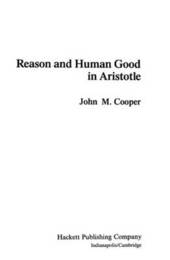
|
Reason and Human Good in Aristotle
Paperback / softback
Main Details
| Title |
Reason and Human Good in Aristotle
|
| Authors and Contributors |
By (author) John M. Cooper
|
| Physical Properties |
| Format:Paperback / softback | | Pages:218 | | Dimensions(mm): Height 216,Width 140 |
|
| Category/Genre | Western philosophy - Ancient to c 500 |
|---|
| ISBN/Barcode |
9780872200227
|
| Classifications | Dewey:171.3 |
|---|
| Audience | | Undergraduate | | Postgraduate, Research & Scholarly | | Professional & Vocational | |
|---|
|
Publishing Details |
| Publisher |
Hackett Publishing Co, Inc
|
| Imprint |
Hackett Publishing Co, Inc
|
| Publication Date |
15 October 1986 |
| Publication Country |
United States
|
Description
"A sophisticated and illuminating study of central questions about Aristotle's views on practical reason and the ultimate good. Cooper's three chapters . . . examine familiar exegetical puzzles in a fresh and challenging way; but they also . . . raise new and fruitful questions about the philosophical merits and implications of Aristotle's theories. . . . He writes vigorously and lucidly, with both scholarly rigor and philosophical imagination." --T. H. Irwin in Archiv fur Geschichte der Philosophie
Author Biography
John M. Cooper is Stuart Professor of Philosophy, Princeton University.
ReviewsReason and Human Good in Aristotle opens up issues of interpretation which are as alive today as when it originally appeared. After almost two decades of extraordinary influence, this succinct book remains a 'must' for any serious bibliography of Aristotle's Ethics . --Sarah Broadie, Princeton University Cooper's careful and detailed treatment of deliberation and the content of good deliberation brought scholarship on Aristotle's moral philosophy to a new level of sophistication, and his book remains essential reading for anyone who is grappling with Aristotle's complex views about these fundamental issues. --Richard Kraut, Northwestern University A sophisticated and illuminating study of central questions about Aristotle's views on practical reason and the ultimate good. Cooper's three chapters . . . examine familiar exegetical puzzles in a fresh and challenging way; but they also . . . raise new and fruitful questions about the philosophical merits and implications of Aristotle's theories. . . . He writes vigorously and lucidly, with both scholarly rigor and philosophical imagination. --T. H. Irwin in Archiv fur Geschichte der Philosophie
|